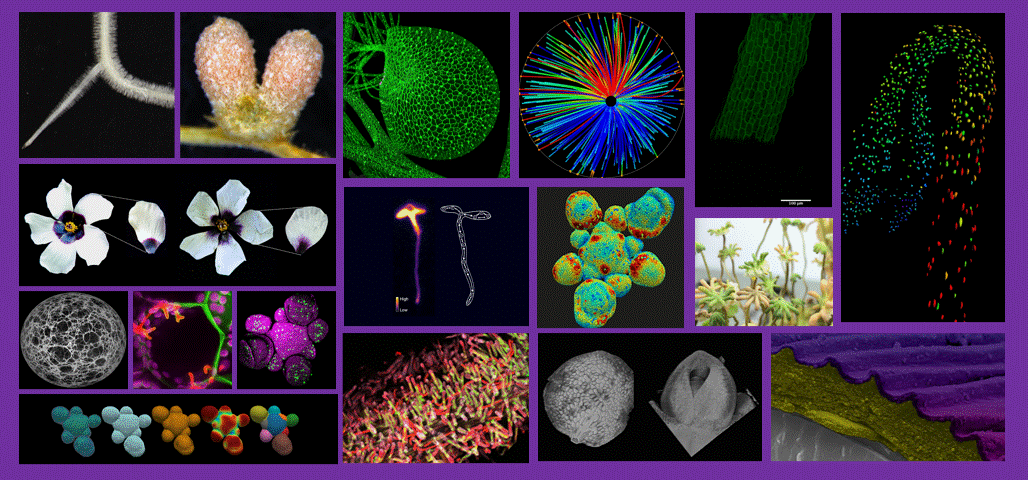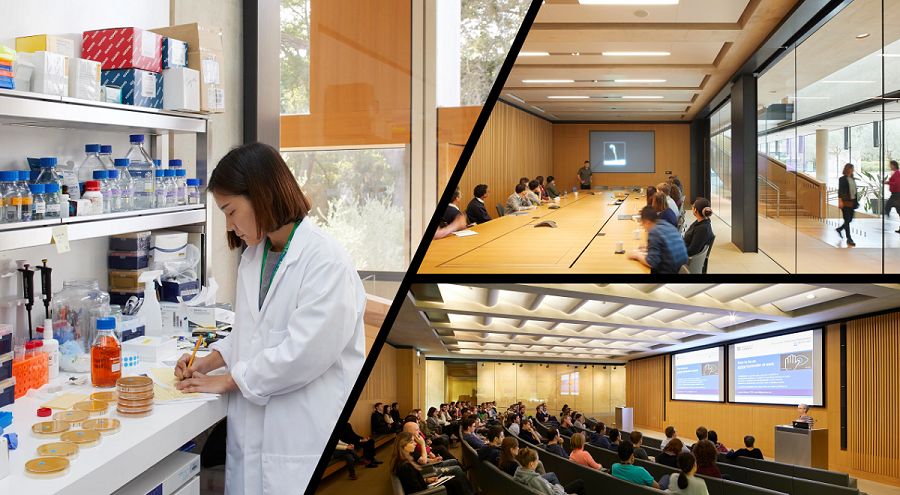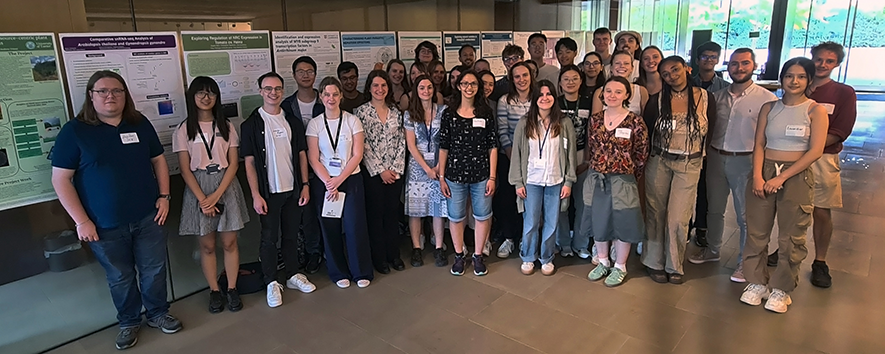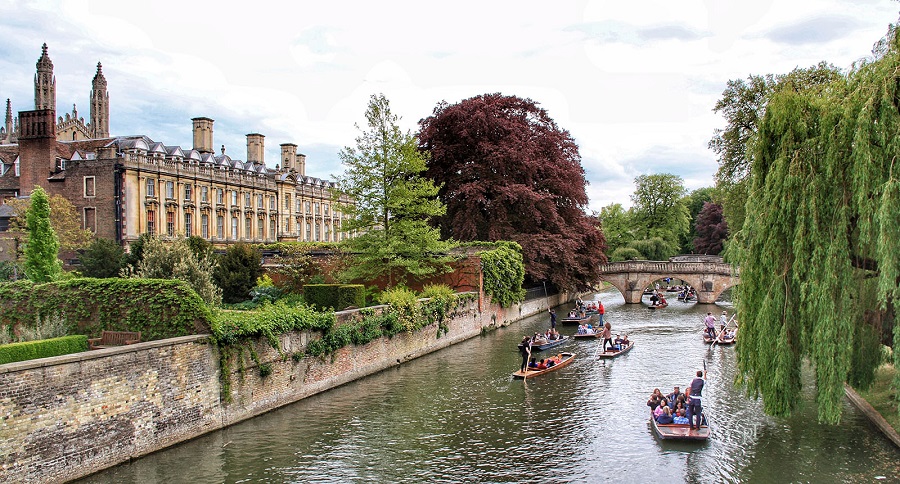Undergraduate summer research projects
We offer undergraduates considering a research career the opportunity to undertake a research project over their summer vacation. Each Sainsbury Laboratory research group can host a maximum of one student each year.
Key dates
Applications open: 15 January 2026
Applications close: 31 March 2026
Applicants notified of outcome: 30 April 2026
The 2026 Application Form will be posted on this page on 15 January 2026.
Eligibility requirements
You must be currently enrolled in a science undergraduate degree at a UK university, have a genuine interest in scientific research and an eagerness to learn about new areas of science.
Unfortunately, we cannot accept candidates who will have completed the final year of their undergraduate studies by the time they begin their summer project.
You must also meet one of these below criteria:
-
Be a UK national (meeting residency requirements).
-
Have settled status.
-
Have pre-settled status (meeting residency requirements).
-
Have indefinite leave to remain or enter.
-
Have a current student visa to study in the UK.
Research project overview
You will do your research project within experimental and/or modelling teams integrating biology, physics and mathematics. We welcome students studying any relevant science background, including biology, mathematics, physics, genetics, biochemistry, animal science or computational modelling. All projects involve the planning, assimilation, interpretation and presentation of research data.
Most research projects will run between June-August, however we offer flexible research project start dates so you can fit around your other commitments. You will be invited to present your project at the Plant Biology Summer Student Career and Poster Session in mid-August.
How to apply
Please complete the online application form (link published on this page on 15 January 2026) and upload:
-
A 500-word cover letter explaining why you would like to do a research project with the research group that you have selected and outlining what you hope to gain from the research project. Select one Research Group where you would like to complete your research project.
-
An official transcript of your academic record at university.
-
You curriculum vitae (CV) listing the courses you are studying and any relevant experience.
Joining a research group
A career in life sciences research can be extremely rich and rewarding. However, you might find it difficult to imagine what it would be like to be part of a research institute. Your summer research project will give you an opportunity to find out what it is like to be in a research institute.
You will:
- Join one of our research groups and carry out an original research project alongside our scientists with full access to all our research facilities.
- Be under the supervision of a postdoctoral or PhD researcher and be fully embedded within the research group, participate in lab meetings, attend seminars, read research papers, write a research report, present your results to your lab colleagues, and participate in social and other events.
- Be leading your own project under the guidance of your supervisor. You will plan and carry out research, learn how to perform techniques and how to record and analyse your data.
Skills development
This summer project offers you an opportunity to enhance primary research skills and participate in events and activities designed to provide further insight into engaging in a research institute and exploring avenues for career development. You will have the opportunity to develop scientific techniques, including using molecular biology laboratory, horticulture and microscopy facilities.
We bring together specialists in biological, physical, and mathematical sciences integrating a range of wet-lab experimental research with computational modelling of plants. This interdisciplinary approach is essential for understanding the complex dynamic and self-organising properties of plants. As a result you will be interacting with scientists from a huge diversity of backgrounds.
Meet other scientists
You will interact closely with your Research Group members, but will also have opportunities to network with PhD students and scientists across the whole Sainsbury Laboratory community to talk to them about their jobs and get advice about careers and educational opportunities. There will be many chances to join informal and social gatherings and learn about other research happening at the institute.
Explore Cambridge
Our community has lots of different social and sporting groups who you can join while at the Sainsbury Laboratory, like indoor climbing, running, volley ball, yoga classes, art classes, dance lessons, board games, crafts, tennis, book and jigsaw swap, movies etc. We will also organise a number of recreational activities during your time at the Sainsbury Laboratory, including BBQs, walks to Grantchester and punting on the River Cam!
Who can apply
You will need to be currently enrolled in a science undergraduate degree at a UK university, have a genuine interest in scientific research and an eagerness to learn about new areas of science. Our research projects are aimed at undergraduate students who have just finished their second year of study, but this is flexible.
To be eligible for a research project, you must be an undergraduate bachelor student who:
- Is enrolled in your first undergraduate degree in a relevant science discipline (eg biological/life sciences, biochemistry/chemical sciences, physical/mathematical/computing sciences, environmental sciences or biomedical sciences).
- Is able to demonstrate a strong record of academic performance.
- Has an interest in undertaking a research postgraduate degree (MPhil or PhD).
- Is not a final-year undergraduate already accepted/committed to a PhD/MPhil programme or have already graduated from your degree.
If selected, you will be asked to provide evidence of registration at your home Institution for the period of your visit at the Sainsbury Laboratory.
You must also meet one of these below criteria:
- Be a UK national (meeting residency requirements).
- Have settled status.
- Have pre-settled status (meeting residency requirements).
- Have indefinite leave to remain or enter.
- Have a current student visa to study in the UK.
All science disciplines welcome
We are a multidisciplinary plant sciences research institute integrating biology, physics and mathematics. This interdisciplinary approach is essential for understanding the complex dynamic and self-organising properties of plants and so we welcome students from biology, plant sciences, mathematics, physics, genetics, biochemistry, animal sciences, computational modelling etc to join us.
Widening participation
We want to encourage and support students from diverse backgrounds to move into postgraduate training and careers in research. Our undergraduate summer research projects aim to bring talented students to Cambridge from all backgrounds by promoting diversity of attendance and inclusivity of participation of groups that are underrepresented in science research. We particularly welcome applications from students who come from underrepresented or disadvantaged groups.
The University of Cambridge is committed to equality of opportunity.
Applications for 2025
The 2026 Application Form will be posted on this page on 15 January 2026. Applications close on 31 March 2026.
How to apply
Identify an area of research that interests you by finding out about what topics SLCU research teams work on.
Complete the online application form and upload:
- A 500 word cover letter explaining why you would like to do a research project with the research group that you have selected and outlining what you hope to gain from the research project.
- An official transcript of your academic record at university.
- You curriculum vitae (CV) listing the courses you are studying and any relevant experience.
Complete the online application form by 31 March 2026.
Funding to support your research project
To help with your living expenses while in Cambridge, you will receive a bursary while undertaking your research project at the Sainsbury Laboratory. If you have already secured funding or are planning to apply for your own funding, such as for one of the scholarship programmes like Amgen, please contact the Group Leader who you are interested in working with to discuss.
Other scholarship programmes
There are a number of other separate summer research scholarship programmes that the University of Cambridge operates. See details below.
Amgen Scholars Programme
The Amgen Cambridge Scholars Programme offers undergraduate students from across Europe the opportunity to take part in an eight week research project within one of the laboratories at the University of Cambridge. Accommodation is provided at a Cambridge college throughout the programme. The Sainsbury Laboratory is one of the departments that students can choose to undertake their internship at.
Scholars are also invited to take part in weekly evening sessions as part of our professional development programme. In recent years this has included sessions exploring different scientific careers, applying for graduate education and on how to prepare and present scientific posters. The programme culiminates in an Annual Symposium and include Amgen Scholars from the other four Amgen programme sites.
Applications: Applications for the 2026 Amgen Scholars cohort will open in November.
Find out about the Amgen Scholars Programme
Experience Postgrad Life Sciences internships for UK and Republic of Ireland students
The University of Cambridge's School of Biological Sciences runs an Experience Postgrad Life Sciences scheme, offering 8-week paid research internships with free accommodation to UK and Republic of Ireland residents who are studying at a UK or Republic of Ireland university for their undergraduate bachelor degree and are in their penultimate year of study. The programme in includes free accommodation. The Sainsbury Laboratory is one of the departments that students can choose to undertake their internship at.
Application deadline: Application dates for 2026 will be added when available.
Finding a place to live
You will receive a bursary to help cover accommodation, living expenses and travel. We are not able to provide accommodation, but will be happy to point you to resources for short-term rental options in the local area.
The below services list accommodation options in Cambridge:
Visit Cambridge website
The Visit Cambridge website lists College Rooms, B&Bs, Guest Houses and Apartments:
University Accommodation Service
The University of Cambridge Accommodation Service provides access to their accommodation service if you wish to rent a whole property for 2 weeks or longer, between June and September. Fill in their registration process.
Email: accommodation.service@admin.cam.ac.uk
Telephone: (01223) 338099)
The University Accommodation Service also lists accommodation provided by private landlords for short-term lets:
Collecting and storing your personal data
We ask you to provide personal data about yourself when applying for a Sainsbury Laboratory Undergraduate Summer Research Project in order for us to process your application.
We are committed to keeping your personal information safe and secure. Your application and personal details are kept for a period of 12 months after the programme has concluded after which information is anonymised and stored for reporting and statistical purposes.
Accessing, correcting or deleting your information
We want to make sure that your personal information is accurate and up to date. You have the right to request a copy of the information we hold about you, to request a correction and to request that your personal data is deleted.
For more information about how we handle your personal information, and your rights under data protection legislation please see https://www.information-compliance.admin.cam.ac.uk/data-protection/general-data
Do you have any questions?
If you have any questions about undergraduate research projects, please contact enquiries@slcu.cam.ac.uk.




